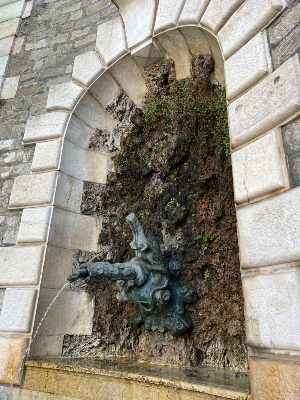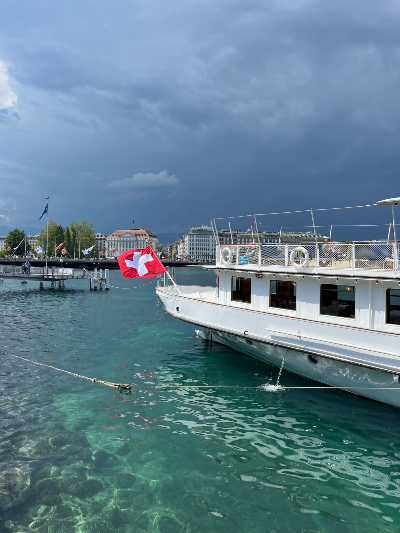Welcome to Switzerland!
I have now spent a little over a week in Geneva, Switzerland. I am here to intern for International Bridges to Justice (IBJ), whose mission is chiefly to promote the rule of law in the criminal justice process throughout the world. While following blog posts will explore the work I have the opportunity of doing for IBJ, this week's post acts as an introduction to Switzerland. As the culture of a new place is initially the most impactful part of traveling, all I have learned about Switzerland has framed the experiences of my past week. I hope this to lay a necessary foundation, since I believe that the context of my internship is a vital part of the experience.
Multiculturalism
Switzerland is divided into three main linguistic regions. German predominates in the north, east, and center; French in the west; and Italian in the south. Geneva is far to the west and is thus imbued with French culture. While it is rare here to find things written in English, most locals can quickly switch to English. Beginning in elementary school, children are taught the language of their region in addition to a second national language and English.
Geneva itself is a multicultural hub due to its prominence in international affairs. Including the United Nations and the Red Cross, Geneva hosts 42 international organizations. IBJ is one of the approximately 750 non-governmental organizations here. Accordingly, Geneva is often the meeting place for diplomats, heads of state and government, and other dignitaries to engage in international collaboration and to promote global peace. This became apparent to me as the first person I spoke with outside of the airport was a representative of Azerbaijan who was in Geneva for a UN climate change conference. Also, IBJ's office is one floor above a Somali embassy!
Swiss Politics
Swiss politics are heavily influenced by the country's multiculturalism. Switzerland initially chose to remain neutral in armed conflict out of self-preservation—the divergent allegiances within its borders prevented the country from taking a side without inflaming tensions. This history allows the country to now champion humanitarian aid and peace in international affairs. To promote peace within its borders, Switzerland's domestic politics balance autonomy and collaboration.
Switzerland is a federal republic consisting of 26 cantons. Each canton has a distinct tax, legal, fiscal, and education system. The country is governed by the Federal Council, a seven-member body representing the major political parties and reflecting the country's different national languages. A president is elected among the councillors for a one-year term. Decisions of the Federal Council must be made by consensus.
Switzerland has a bicameral parliament called the Federal Assembly. The upper house is the Council of States, which represent the cantons. The National Council represents the people proportionally by political party. All members are elected directly. Additionally, certain major issues are decided directly by the people through referendum.
Environmentalism
The most evident way Swiss values affect everyday life is the country's commitment to environmentalism. Perhaps this was borne out of the country's desire to preserve its beautiful alps. On my first day walking through Geneva, I regularly encountered intricate water spouts that I quickly learned were for drinking. Not only does Switzerland have advanced filtration systems for the public's water use, it also focuses on anti-pollution, producing perfectly clear water in Lake Geneva.
Switzerland's commitment is further evinced in it being the first country to have made catalytic converters compulsory. Vehicle emissions standards continue to be among the most stringent in the world. The exceptional Swiss bus and train systems make choosing to reduce environmental waste easy for the public. Smaller ways that eco-consciousness has appeared in my time here are a lack of single-use items, absolutely no fans, restrictions on air-conditioning, hand-held shower heads to conserve water, and scrupulous recycling.
I have noticed a connection between environmentalism and a relaxed lifestyle. Since people are less in a hurry, they seem to naturally produce less waste. Walking long distances to various destinations throughout the day is normal. With only small grocery stores in Geneva, people make smaller and more frequent trips, allowing selections to be based on more immediate needs. Like most of Europe, Geneva has a rich café culture. Most cafés do not allow laptops in order to preserve themselves as social environments. They are places of leisure, not convenience! Meals in general are typically enjoyed within restaurants, reducing the need for take-away waste. I have been hit with the irony that America's compulsion to not waste time has made our culture waste nearly everything else! The way environmentalism is ingrained in Swiss life has inspired me to integrate similar lifestyle changes once I am home.

